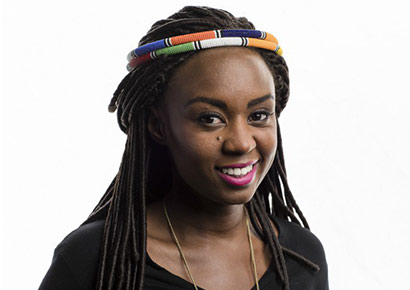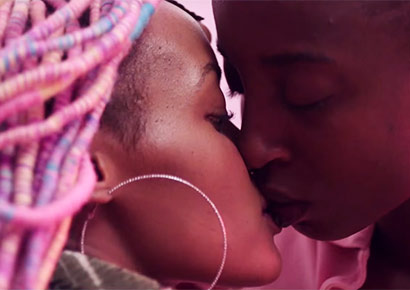Rafiki director sues Kenyan government over lesbian love story ban

Wanuri Kahiu
Wanuri Kahiu, the director and co-producer of the groundbreaking lesbian love story Rafiki, is suing the Kenyan government in a bid to overturn the acclaimed film’s ban.
Rafiki (meaning ‘friend’) is based on the award-winning short story Jambula Tree by Monica Arac de Nyeko. It is a coming of age tale about two Kenyan girls who fall in love and whose desire for each other flies in the face of African conventions.
It was banned by the Kenya Film Classification Board (KFCB) in April, shortly before it became the first-ever Kenyan movie to screen at Cannes as part of the prestigious festival’s official line up.
It’s been revealed that Kahiu is now suing the KFCB and its virulently homophobic CEO, Ezekiel Mutua, in a constitutional challenge. The petition, filed on 11 September, argues that the ban is against freedom of expression, freedom of artistic creativity and goes beyond the limitations stated in Article 33 (2) of the Constitution of Kenya.
“As filmmakers, creatives and storytellers we believe in the intrinsic value of our work. We believe that freedom of expression is the cornerstone of any democracy. The unreasonable and unjustifiable censorship of films infringes on our rights of freedom of expression and freedom of the media as enshrined and guaranteed in the Constitution of Kenya,” said Kahiu in a statement.
She is challenging 12 sections of the Film and Stage Plays Act and the Kenya Film and Classification Board Classification Guidelines, 2012.
“Sections of the Films and Stage Plays Act, CAP 222 are a threat to free speech and media freedom. They limit the freedom of artists to impart information and restrict freedom of artistic creativity, contrary to the constitutional limits of freedom of expression”, said Kahiu.
The director has requested that the court urgently lift the ban on Rafiki to enable the Oscars Selection Committee Kenya to consider the film for entry to the Academy for the Best Foreign Language Film category award at the 2019 Oscars. Without lifting the ban, the film cannot be considered for selection. The entries close on 30th September 2018.
 “This isn’t about me personally,” said Kahiu. “It’s about the freedom for all industry players to tell the stories they want to tell and not to be censored. The world is quickly becoming a village and the film industry is worth more than USD 30 billion globally. The opportunities for more Kenyans especially the youth to participate in this sector is immense. We should not let colonial laws stop us from achieving this.”
“This isn’t about me personally,” said Kahiu. “It’s about the freedom for all industry players to tell the stories they want to tell and not to be censored. The world is quickly becoming a village and the film industry is worth more than USD 30 billion globally. The opportunities for more Kenyans especially the youth to participate in this sector is immense. We should not let colonial laws stop us from achieving this.”
In its review of the movie, Variety described Rafiki as a “tender tale of first lesbian love” and called it “a lively, brightly performed film”. Rafiki was co-produced by South African company Big World Cinema. It will be screened as part of the the Cape Town International Film Market and Festival (CTIFMF) in October.
Homosexuality is outlawed in Kenya, with penalties including five to 14 years in prison. There is, however, a legal challenge underway in the courts to repeal these sections of the Penal Code as unconstitutional.
Leave a Reply